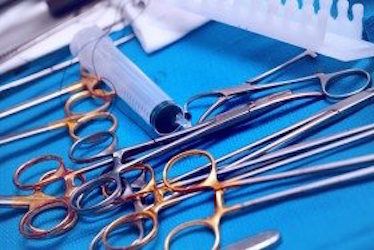Nov 29, 2016
ASD is pleased to share this Guest Blog Post from ASD Rewards Partner, MedPro Disposal. MedPro provides reliable, cost-effective medical waste disposal services to large and small quantity generators of medical waste. In this guest blog post, MedPro outlines what protocol funeral directors should follow when disposing of medical waste and explains how OSHA regulations impact funeral homes.
The 4 Main Components of Safe Biohazardous Waste Management in a Funeral Home
When it comes to managing a funeral home, disposing of the potentially infectious waste stream can feel daunting. However, if you understand the 4 main components of safe waste management, you will be on your way to running a safe funeral home that is fully compliant with all regulations.
1. Types of Funeral Home Medical Waste
Listed below are the most common types of medical waste found in funeral homes.
→ Sharps waste, such as needles.
→ Materials such as gauze and gowns that accompany the deceased to the funeral home.
→ Materials used in the preparation room such as disposable gloves, gauze and tubing.
2. Funeral Home Waste Must Be Properly Segmented
The National Funeral Directors Association issued a document entitled Funeral Home Medical Waste Protocol. This includes a list of wastes not classified as medical waste that must be disposed of by other means. These include, but are not limited to:
→ Pharmaceutical Waste
→ Chemical Waste
→ Radioactive Waste
→ Bulk Chemotherapy Waste
Then there are wastes types like trace-contaminated chemotherapy waste, which differ from bulk or unused chemotherapy drug waste. An example of this would be used chemotherapy drug vials that could potentially accompany the deceased to a funeral home. In many states this type of waste can be placed in the biohazard waste bins that are picked up by your medical waste company.
On the other hand, pathological wastes such as bodily fluids or tissue, often must be segregated or labeled separately from your biohazard waste because of the method used for properly disposing of such waste. Rather than an autoclave, this type of waste often needs to be incinerated to ensure all potentially infectious material has been destroyed. If your medical waste hauler determines that pathological waste has been mixed with other biohazard waste then they may be forced to treat all waste as if it were pathological, which could result in an increased cost passed on to the funeral home.
Most important of all, biohazardous waste must be properly packaged in leak-proof containers that are properly labeled. Any sharps waste such as needles or syringes must be first placed in a rigid, puncture-proof container before being placed in the red biohazard bag.
3. OSHA Regulations Affect Funeral Homes
OSHA bloodborne pathogens training that meets hazard communication standards must be provided to all employees who may come in contact with blood or other potentially infectious bodily fluids during their employment. This includes writing an exposure control plan outlining how the funeral home will protect employees from exposure to infectious wastes.
Check with your medical waste provider to see if they have a compliance program available. Many offer online solutions that are economical and still provide everything you need to protect your business.
4. Personal Protective Equipment is Key
In addition to OSHA training, personal protective equipment (PPE) to prevent exposure is key. PPE can include face and eye protection, body protection, hand protection and more. Look at the nurse who recently contracted the Ebola virus after caring for a patient in Dallas with Ebola. Director of the Centers for Disease Control and Prevention (CDC), Tom Frieden, said “We don’t know what occurred, but at some point there was a breach in protocol.” He went on to say that treating a patient with Ebola can be done safely but “even a single inadvertent slip can result in contamination.” This will becoming even more vital if more patients die from Ebola and their remains may be handled by coroners and medical examiners.

MedPro Disposal began in 2009 after the company’s founders recognized a serious lack of choice in medical waste disposal services. MedPro provides reliable, cost-effective medical waste disposal services tolarge and small quantity generators of medical waste. In 2011, the company began to expand operations and is now providing service in 44 states in cooperation with more than 80 regional affiliate haulers. By partnering with MedPro, the average funeral home saves up to $1,254.00 annually from reduced service costs. As part of our Rewards Program partnership, ASD clients who sign up with MedPro will receive a monthly credit towards their ASD bill for one full year. To learn more, call 888-641-6131 or click here.
About The Author
Jess Farren (Fowler)
Jess Farren (Fowler) is a Public Relations Specialist and Staff Writer who has been a part of the ASD team since 2003. Jess manages ASD’s company blog and has been published in several funeral trade magazines. She has written articles on a variety of subjects including communication, business planning, technology, marketing and funeral trends. You can contact Jess directly at Jess@myASD.com



